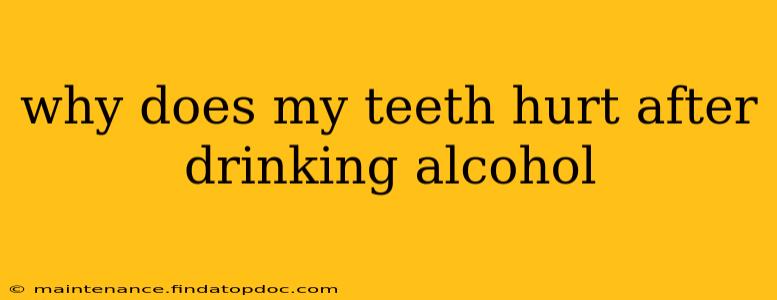Why Does My Teeth Hurt After Drinking Alcohol?
Many people experience tooth sensitivity after consuming alcoholic beverages, and it's a surprisingly common concern. The pain can range from a mild ache to a sharp, throbbing sensation, often triggered by hot, cold, or sweet drinks, even after the alcohol is gone. Understanding the underlying reasons is key to managing this discomfort.
Here are some of the key factors contributing to tooth pain after alcohol consumption:
1. Alcohol's Acidity:
Many alcoholic drinks, particularly wine (especially red wine) and spirits, are acidic. This acidity erodes tooth enamel, the protective outer layer of your teeth. This erosion weakens the enamel, exposing the sensitive dentin layer underneath. The dentin contains microscopic tubules that lead directly to the tooth's nerve, making your teeth more vulnerable to temperature changes and other stimuli that would normally be harmless. The longer the alcohol remains in contact with your teeth, the greater the potential for enamel erosion and subsequent pain.
2. Dehydration:
Alcohol is a diuretic, meaning it increases urine production and can lead to dehydration. Dehydration reduces saliva production, and saliva plays a crucial role in neutralizing acids in the mouth and washing away food particles. Reduced saliva flow leaves your teeth more susceptible to acid damage and increases the risk of experiencing pain.
3. Sugar Content:
Many alcoholic drinks contain added sugar, which feeds bacteria in your mouth. These bacteria produce acids as a byproduct, further contributing to enamel erosion and increased sensitivity. This is particularly true for sugary cocktails and mixed drinks.
4. Existing Dental Issues:
If you already have existing dental problems like cavities, gum disease (gingivitis or periodontitis), or exposed tooth roots (recession), alcohol can exacerbate these conditions and intensify tooth pain. The acidic nature of alcohol can irritate inflamed gums and expose sensitive areas, leading to discomfort.
5. Grinding or Clenching:
Alcohol can sometimes relax inhibitions, leading some individuals to unconsciously grind or clench their teeth more forcefully. This can wear down enamel, irritate the jaw muscles, and trigger tooth sensitivity.
How Can I Reduce Tooth Pain After Drinking Alcohol?
- Rinse your mouth: After consuming alcohol, rinse your mouth thoroughly with water to help remove the acidic residue and sugar.
- Wait to brush: Avoid brushing your teeth immediately after drinking alcohol, as the softened enamel is more vulnerable to damage from brushing. Wait at least 30 minutes.
- Use fluoride toothpaste: Choose a toothpaste that contains fluoride to help strengthen enamel and protect against acid erosion.
- Drink plenty of water: Stay well-hydrated to help maintain a healthy saliva flow.
- Limit alcohol consumption: Moderation is key. The less alcohol you consume, the lower your risk of experiencing tooth pain.
- Maintain good oral hygiene: Regular brushing, flossing, and dental checkups are essential for preventing dental problems and maintaining healthy teeth and gums.
When to See a Dentist:
If you experience persistent or severe tooth pain after drinking alcohol, or if you notice any signs of enamel erosion or gum disease, it's crucial to consult a dentist. They can assess your oral health, identify the underlying cause of your pain, and recommend appropriate treatment options. Early intervention is vital to prevent further damage and maintain optimal oral health.
